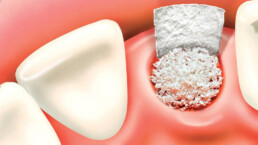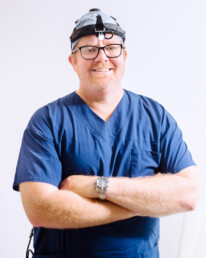Bone Graft Surgery

About Bone Grafting
In some patients who would like dental implants, there may be insufficient bone to safely place an implant. This may be due to previous tooth loss, trauma, pathology (cysts or tumours), congenital deformity such as cleft lip or palate or as a result of ageing.
In such cases, bone grafting will be performed to improve the available bone quantity and quality to enable successful implant placement.
Bone grafting is an all-inclusive term which may refer to socket preservation, ridge augmentation, or sinus lifts.
Why would I need to have Bone Graft surgery?
Depending on the situation, bone grafting may take place at:
- The time of tooth removal
- Months before the placement of dental implants to allow for adequate healing and to optimise aesthetics
- The same time as implant placement
Most commonly bone grafts are harvested from other areas of the patient’s body, usually within the mouth, such as at the rear of the lower jaw or the chin. In cases of severe bone loss, bone may be harvested from other sites such as the hip, lower leg (tibia) or outer skull.
Other options for bone grafting include:
- Xenografts which are medical grade sterilised animal (usually cow) bone
- Allogenic bone which is sterilised bone sourced from a person who has donated their bone for this purpose
What anaesthetic will I have my Bone Graft surgery?
Some minor bone grafting procedures, particularly those occurring at the time of tooth removal, can be performed under local anaesthetic with injections to numb the teeth, gums and nearby structures so you do not feel any discomfort.
More involved procedures are performed in hospital under general anaesthetic. You will be asleep for the duration of the procedure. You will be admitted on the day of your procedure and usually will be discharged either the same day or the next day after review by Dr Tuckett.
How long is the recovery after Bone Graft surgery?
After your procedure, Dr Tuckett will provide you with specific instructions regarding your post-operative care. The recovery time depends on your medical conditions, age, bone type, what graft was chosen and how extensive the surgery was to place your graft. In most cases your discomfort should settle after 1-2 weeks. The bone is left to heal for 3-6 months to provide a solid base for your implant. Dr Tuckett will arrange a scan to assess bone healing and suitability for implants once your surgery and healing time are completed.
After surgery care
After your procedure, Dr Tuckett will provide you with specific instructions regarding your post-operative care, general instructions are available here.

About Dr Joel Tuckett
Dr Tuckett is a contemporarily trained Oral and Maxillofacial Surgeon. He engages in a patient centred approach to ensure a caring and comfortable journey from initial consultation to discharge.
Dr Tuckett is and internationally published author in the fields of Facial trauma, Antibiotic stewardship, Radiotherapy induced Xerostomia, Parotid surgery and Head and Neck cancer. He is a senior lecturer at the University of Queensland where he educates both medical and dental students.
He currently has public appointments at the Princess Alexandra, STARS and Mackay Base hospitals where he works to train the new generation of surgeon.
